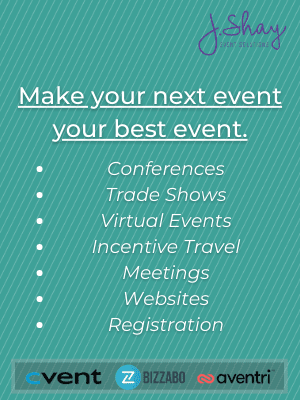Business leaders know that to launch a successful project of any size requires clear goals and a committed team of people all on the same page. But with so many team members swamped with jam-packed schedules, and some team members working remotely, it can be tough to harness the potential of human capital.
This is why event workshops have become so popular: they are incredibly effective at gathering your team, generating ideas and building consensus around a project. With everyone in the same room all focused on the project at hand, trust, dedication, and commitment can flourish.
That’s the good news.
The not so good news is it can be incredibly challenging to pull off a successful event workshop. Ask any in-house event planner and they’ll tell you that the legwork and logistics necessary to ensure the intended value is delivered is substantial.
Tips to Help You Plan a Successful Event Workshop
- Identify and Communicate Your Agenda
As with any corporate event, a workshop requires a clear agenda, and this agenda must be communicated to all participants before the session.
What should your agenda include?
It should give attendees a clear indication of what topics will be covered that day. This will help your team members come prepared and ready to contribute!
Your agenda is also a great opportunity for you to set any expectations. For instance, you may want to make it clear that during a certain timeframe of your session, no screens will be allowed. If you go this route, be sure to also highlight specific breaks in the schedule that will allow your participants to check their texts and email.
One final note on agendas: The more details you include, the easier it will be to adapt on the fly. If you’ve run a event workshop before, then you know they often require a bit of improvisation and adaptation to better fit the dynamics of the particular group. So try to be detailed so your event has built-in flexibility that will still allow you to reach you goals.
- Invite Diverse Participants
Innovation requires that a multitude of perspectives take part in the discussion. If you are the one in charge of inviting workshop participants, be sure to select individuals from across different disciplines and from multiple levels within your organization. A successful event workshop will encourage participants to think at a higher level so that practical solutions may be discovered. But this really only works when diverse opinions, backgrounds and skillsets are represented.
- Select the Proper Space
Like any other event you plan, the venue you select will significantly impact the success of your event workshop. Ideally you will book a space that provides ample room for all attendees but also keeps the setting intimate. Also, make sure everyone has a clear view of any slides or whiteboards.
If for some reason you aren’t able to visit the space yourself beforehand, make sure to get clear photos of the room. If you do tour the venue in person, be sure to take a few photos yourself. You can use these to plan seating and where smaller groups can mingle and work together, should the team be split up for brainstorming activities.
A final note on booking a workshop venue: be sure you book the space for 30 minutes before the session is scheduled to start and an hour afterward. This time can be used for set up/tech checks beforehand and general cleanup and documentation afterward.
- Encourage Participation
Once your agenda has been set, participants invited and venue booked, it’s time to think about how to bring some fun and excitement to the workshop. The key to a successful event is getting everyone involved.
Here are some general tips on how you can create group exercises:
- When planning group exercises, keep the size of each group small. This will help those individuals who get nervous speaking around others feel more comfortable to share their ideas.
- Be sure to mix and match your groups. By this I mean don’t put all members from the same department in the same group. The goal here is to encourage team members who don’t normally interact with each other at work to engage.
- Consider planning for each brainstorming session to start with a fun icebreaker. A simple but effective icebreaker is “one question.” This is where you simply ask each team member in that group the same question. Make the question fun. For example, you could ask, “What is a little-known fact about you?” or “What do you remember most about your first day of work?”
- Develop a Follow-up Plan
By following the first 4 tips you will set yourself up to plan a wildly successful event workshop. Now the question is, how will you communicate the decisions/solutions that were identified during the event? Will you mass email everyone with details? Put the information on your company’s intranet? Hold a meeting once everyone is back in the office? However you choose to share the news, it’s important that your team members know their hard work actually resulted in a plan of action.
The Wrap
There’s no doubt that planning a successful event workshop takes a lot of work. But if you follow these tips, you will create an event that will offer your organization tremendous value.
Need some help planning your next (or first) workshop? We can help take some of the logistical tasks off your to-do list so you can focus on creating an agenda that inspires and motivates your team – Click here to contact us!
You might also like…
How to Save on Event Catering in 2024
The golden age of bottomless champagne fountains and endless platters of gourmet hors d'oeuvres at...
How to Successfully Market Your Event in 2024
According to a survey from Eventbrite, 80% of an event’s revenue target should have already been...
5 Great Company Holiday Party Ideas for 2024!
Company holiday parties generally go one of two ways: They are either a blast, or something...
Holiday Event Ideas for Remote Workers
The annual year-end holiday party is typically the best opportunity for companies to recognize and...
Virtual Holiday Party Ideas for 2024
Have you been put in charge of planning your company’s virtual holiday party? Stumped for ideas?...
Top East Coast Cities for Your Next Sales Meeting
When it comes to choosing where to hold your next sales meeting, there are a lot of things to...

J.Shay Team is the generic alias for our event staff that want to submit work anonymously.









